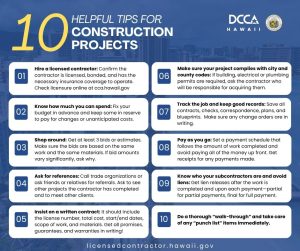Hire a Licensed Contractor
The Department of Commerce and Consumer Affairs emphasizes you take the time to do your research and hire a licensed contractor. Please review the information below to learn more about the importance of licensed contractors.
RICO’s Top 10 Tips
Resources and Handouts
- RICO’s Top 10 Tips for Consumers (PDF)
- Information for Consumers About the Contractors Recovery Fund (PDF)
- Hire a Licensed Contractor Because (PDF)
- Risks and Responsibilities of Being an Owner Builder (PDF)
List of Licensed Contractors – Current as of July 15, 2025
Contractors: PDF / Excel File
Electricians and Plumbers: PDF / Excel File
Engineer, Architect, Surveyor and Landscape Architect: PDF / Excel
License Classification Descriptions
Are you thinking about remodeling your home? As a homeowner, you’ll probably hire a contractor to do the work. Make sure you do your homework before you begin your project.
Click on the following link to watch a public service announcement on the importance of hiring a licensed contractor:
When is a contractor’s license required?
A contractor’s license is required:
- for any project exceeding $1,500 in labor and material
- for any project that requires a building, electrical or plumbing permit.
Electrical and plumbing contractors must employ licensed electricians and plumbers to perform the actual electrical and plumbing work, respectively.
Why hire a licensed contractor?
- A licensed contractor has the training and experience necessary to obtain a contractor’s license. The State of Hawaii’s Contractor’s License Board has checked into the contractor’s background and is satisfied that the person is qualified to hold a contractor’s license.
- A licensed contractor has worker’s compensation and liability insurance. This protects you as a homeowner from putting your property at risk if anyone is injured on your project or if anything is damaged while the work is being done.
- A licensed contractor is able to obtain and sign building permits.
- Lastly, if anything goes wrong with your home improvement project, the Contractor’s Recovery Fund may be available to you only if you have hired a licensed contractor.
How can I be sure a contractor is licensed?
Get the contractor’s name and license number and call the Licensing and Business Registration Information Section at 808-587-4272 or click on the following link: www.businesscheck.hawaii.gov .
How do I report unlicensed activity?
If you come across a person or business that is engaged in or offering to do contracting work but you discover that the person or business does not hold a contractor’s license, please notify the Regulated Industries Complaints Office at 808-587-4272 or call toll-free 1-800-394-1902. In order for RICO to investigate unlicensed activity, it is important to provide as much information as possible.
This is the kind of information that would be important to provide, especially if the unlicensed person or company has already started to actively work at a jobsite:
- Written contracts or quotes from the unlicensed person reflecting the work to be done and the amount to be paid, and canceled checks or receipts if any payments were made;
- A physical description of each of the workers on the jobsite (gender, height, weight, ethnicity, age, phone number) and how many people are working; description of any vehicles on the jobsite including color, make, model and license number;
- Type of work performed, exact address/location, when the work started and the approximate hours that work occurs, estimated time of completion, and any other relevant information.
To report on-going unlicensed activity, please complete a Report of On-Going Unlicensed Activity. Mail or fax completed forms to RICO.
To File a RICO Complaint
If you have entered into a contract or agreement with an unlicensed company or individual, please complete a RICO Professional Licensing Complaint Form. Please be sure to review the Frequently Asked Questions on the File a RICO Complaint page


